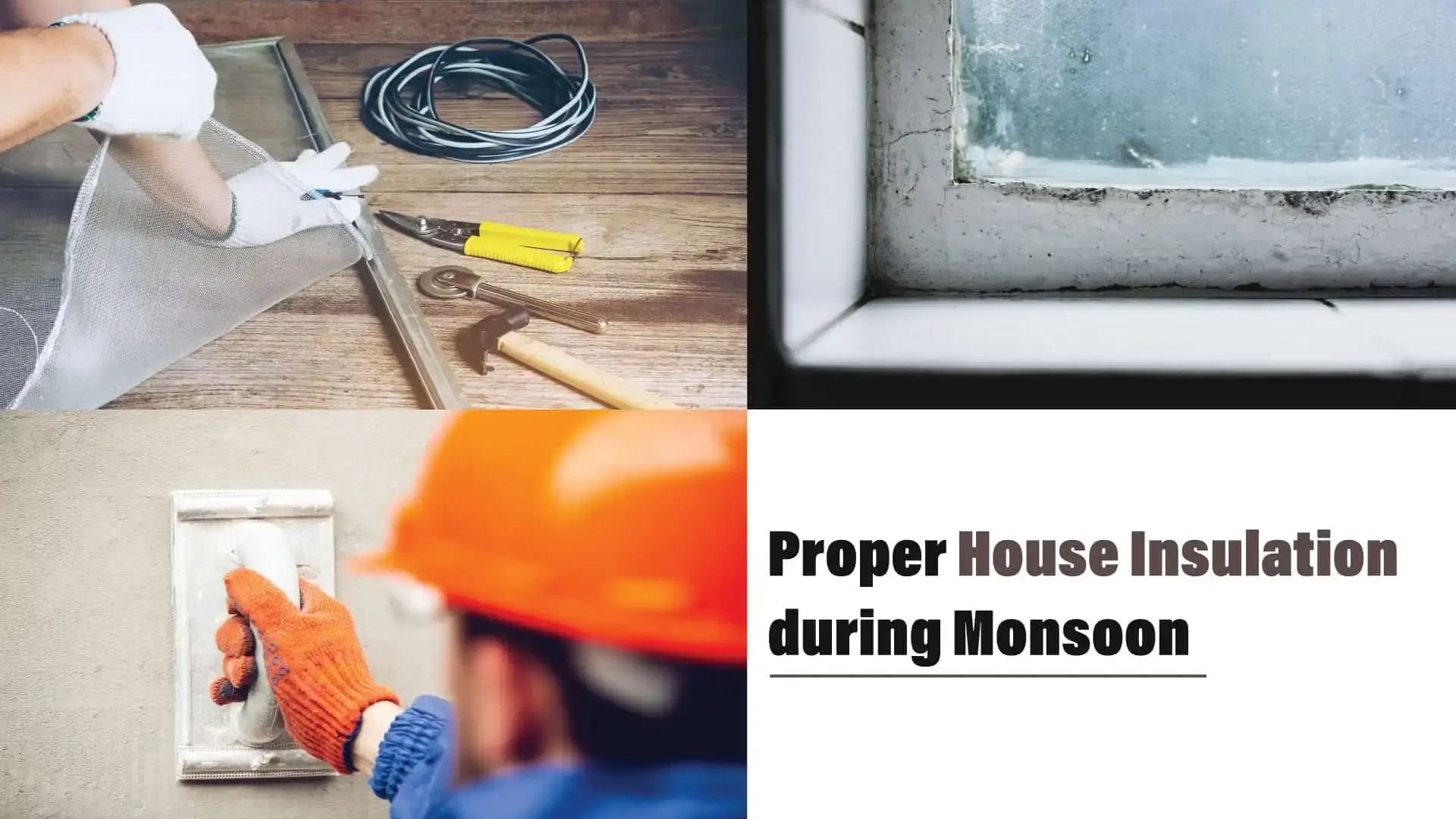Proper house insulation is often overlooked during house construction. While insulation is commonly associated with temperature regulation, its importance extends to protecting structural integrity and maintaining a comfortable indoor environment.
As the rainy season approaches, it becomes crucial to consider the impact of rainwater on various functioning areas of a house. One such aspect is proper insulation. It can prevent water damage, ensure energy efficiency, and enhance overall comfort, especially during the rainy season. Here are some crucial measures by Make My House to be taken in order to ensure proper house insulation practices:
Measures to Ensure Proper House Insulation
Protection against Water Damage:
One of the primary reasons for investing in proper house insulation during the rainy season is to protect the building from water damage. Rainwater can infiltrate the structure through cracks, gaps, or poorly sealed areas. Here’s how insulation plays a crucial role in preventing water-related issues:
a. Moisture Control: Insulation acts as a barrier against moisture infiltration. By creating a continuous layer, it helps prevent the movement of water vapor into the walls, ceilings, or floors. This reduces the risk of mold growth, rotting of wood, and deterioration of building materials, ensuring the long-term durability of the structure.
b. Air Sealing: Insulation materials, when installed properly, contribute to effective air sealing. This means that gaps and cracks that could potentially allow rainwater to enter are minimized. Proper air sealing enhances the building’s resistance to water penetration, preventing leaks and water damage.
c. Drainage Management: Insulation can also aid in managing water drainage. By ensuring proper slope and surface waterproofing, it helps direct rainwater away from the building’s foundation, preventing water accumulation and potential structural damage.
Energy Efficiency and Cost Savings:
Proper house insulation not only protects your home against water damage but also plays a significant role in ensuring energy efficiency. During the rainy season, insulation helps in the following ways:
a. Thermal Regulation: Insulation acts as a thermal barrier, reducing heat transfer between the interior and exterior of the building. In rainy seasons with cooler temperatures, insulation helps retain indoor heat, reducing the need for excessive heating and subsequently lowering energy consumption and utility costs.
b. Preventing Condensation: Rainy seasons often bring high humidity levels. Proper house insulation helps prevent condensation on interior surfaces, such as walls and ceilings, by maintaining a consistent temperature throughout the building. This reduces the risk of mold growth and damage to building materials, improving indoor air quality and reducing maintenance costs.
c. HVAC Efficiency: Insulation contributes to the efficiency of heating, ventilation, and air conditioning (HVAC) systems. By minimizing heat transfer, house insulation helps HVAC systems maintain desired indoor temperatures more effectively. This reduces the strain on the HVAC system, leading to lower energy consumption, extended equipment lifespan, and cost savings in the long run.
Comfort and Indoor Air Quality:
A well-insulated home during the rainy season provides enhanced comfort and improved indoor air quality:
a. Temperature Regulation: Proper house insulation helps maintain a stable indoor temperature, ensuring a comfortable living environment even during temperature fluctuations caused by rain. It prevents drafts, cold spots, and heat loss, promoting a cozy and consistent indoor climate.
b. Soundproofing: Insulation materials, particularly those designed for sound absorption, can help reduce noise transmission from rain or outside sources. This creates a quieter and more peaceful indoor environment, allowing residents to enjoy their living spaces without disturbance.
c. Indoor Air Quality: Insulation also plays a role in improving indoor air quality by minimizing the infiltration of outdoor pollutants and allergens. During the rainy season, when dampness can be a concern, proper house insulation helps control moisture levels, reducing the likelihood of mold growth and the associated health risks.
Sustainable Building Practices:
Proper house insulation aligns with sustainable building practices, contributing to environmental conservation:
a. Reduced Energy Consumption: Insulation reduces the need for excessive heating or cooling, resulting in lower energy consumption and reduced greenhouse gas emissions. This helps mitigate the environmental impact associated with energy production.
b. Durability and Longevity: Insulation protects the building envelope, including its structure and materials, from moisture damage. By ensuring the durability and longevity of the construction, house insulation reduces the need for frequent repairs or replacements, conserving resources and reducing waste.
c. Eco-friendly Materials: Many insulation options now feature eco-friendly materials, such as recycled content or natural fibers. Using these sustainable house insulation materials reduces the carbon footprint of the construction and supports the use of renewable resources.
Conclusion:
Proper house insulation is a vital aspect of house construction, particularly when considering the impact of the rainy season. It safeguards the building from water damage, enhances energy efficiency, improves comfort levels, and promotes sustainable building practices. Investing in quality insulation and ensuring its proper installation can help create a structurally sound, cost-effective, and environmentally friendly home that withstands the challenges of the rainy season while providing a comfortable and safe living environment for its occupants.
FAQs on Maintaining Proper House Insulation during Monsoon
Q: How does proper house insulation prevent moisture intrusion during the monsoon season?
A: Insulation acts as a barrier against moisture infiltration into the home. It helps seal gaps and cracks in walls, ceilings, and floors, preventing rainwater from seeping inside. By maintaining a dry interior environment, insulation protects against water damage and preserves the structural integrity of the building.
Q: Can house insulation help regulate indoor temperature during the monsoon season?
A: Yes, insulation is beneficial in regulating indoor temperature during the monsoon season. It acts as a thermal barrier, preventing heat transfer between indoor and outdoor environments. This helps keep the interior cooler in hot and humid conditions and reduces the need for excessive air conditioning, resulting in energy savings.
Q: What types of insulation are suitable for the monsoon season?
A: Various types of house insulation can be suitable for the monsoon season, depending on the specific requirements of the building. Common options include fiberglass insulation, spray foam insulation, and rigid foam insulation. Consult with insulation professionals to determine the most appropriate type for your home based on factors like climate, budget, and specific insulation needs.
Q: Are there any additional measures to complement insulation during the monsoon season?
A: Yes, in addition to insulation, other measures can complement its effectiveness during the monsoon season. This may include proper roof maintenance, ensuring effective drainage systems, regularly clearing gutters and downspouts and maintaining proper ventilation throughout the home. These actions collectively contribute to a well-protected and comfortable living space during the monsoon season.












One thought on “Importance of Proper House Insulation during Monsoon”